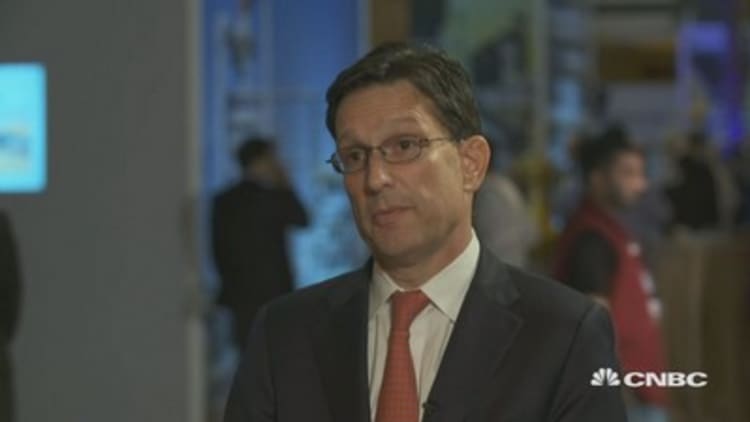
Former congressman and House of Representatives majority leader Eric Cantor had good things to say about Saudi Arabia while speaking at the ADNOC Downstream Investment Forum in Abu Dhabi Sunday.
"I think it's one of most exciting regions to be in at a time when there is so much transformation going on. You have to look at the crown prince of Saudi Arabia and give him a lot of credit for being very bold in his vision and take the kingdom to the next step in terms of an evolution," Cantor told CNBC's Hadley Gamble.
He described an unprecedented anticipation around what he saw as the Islamic kingdom's economic diversification and the deepening of strategic partnerships, both politically and economically.
"I think there are some very bold things going on in this region, and certainly Saudi Arabia is a big part of that," he said.
The Virginia Republican, who served in Congress for 13 years, now helps lead the international investment bank Moelis & Company as its vice chairman. The bank is the sole independent advisor on Saudi Aramco's IPO (initial public offering), the highly anticipated public listing of Saudi Arabia's state-owned oil giant, estimated to be the most valuable company in the world at more than $2 trillion.
Kingdom officials are aiming for the listing to raise around $100 billion and attract a valuation in the range of $1 trillion to $2 trillion, though the listing has been delayed and may not happen until 2019.
The world's largest oil producer, known for its rigid social conservatism, is in the midst of unprecedented economic and social change, launched by its young crown prince, the 32-year-old Mohammed bin Salman, who in 2017 announced women would be given the right to drive.
Investment in non-oil sectors and a raft of privatizations of state assets all stem from Saudi Arabia's Vision 2030, an extensive reform program aimed at economic diversification and reducing dependence on hydrocarbons. The government is looking to private sector investment in order to create jobs for Saudi Arabia's burgeoning youth population, more than 60 percent of whom are under 30.
"I think what you're going see is a lot of interest in terms of foreign investors to be a part of the economic growth that comes from this transformational vision," Cantor said.
"And it's not just in the commerce arena, it has to do with social transformation as well. So there's a lot of opening up going on in the region as a whole, and Saudi Arabia being the largest economy and market here provides a lot of attractive destinations for capital."
A national re-brand?
Major projects underway in the kingdom include NEOM, a 10,000 square mile desert mega-city that will serve as an economic and tech hub between Egypt, Saudi Arabia and Jordan — an estimated $500 billion investment with the first phase set for completion in 2025.
Another project slated to break ground this year is an "entertainment city," a leisure megaplex that Saudi officials hope will rival Disney parks.
Bin Salman in April toured the U.S. on a PR blitz and met with Silicon Valley giants and corporate leaders including Facebook's Mark Zuckerberg and Disney CEO Bob Iger, promoting his government's projects to attract foreign investment. That same month saw Saudi Arabia open its first movie theater in 35 years.
The prince has been the recipient of both praise and intense criticism for a range of controversial moves including the arrest of hundreds of business leaders and royals in what he declared was an anti-corruption crackdown, as well as a devastating bombing campaign over Yemen, the region's poorest country.
Most of Saudi Arabia's major projects are funded in large part by its sovereign wealth fund, though a growing budget deficit and low oil prices give some observers reason to question the projects' viability. Several "economic cities" launched by Saudi Arabia's General Investment Authority in 2005 failed to attract ample private investment.
Oil-exporting countries have been searching for ways to develop alternative revenue sources since the global slump in oil prices in 2014.


